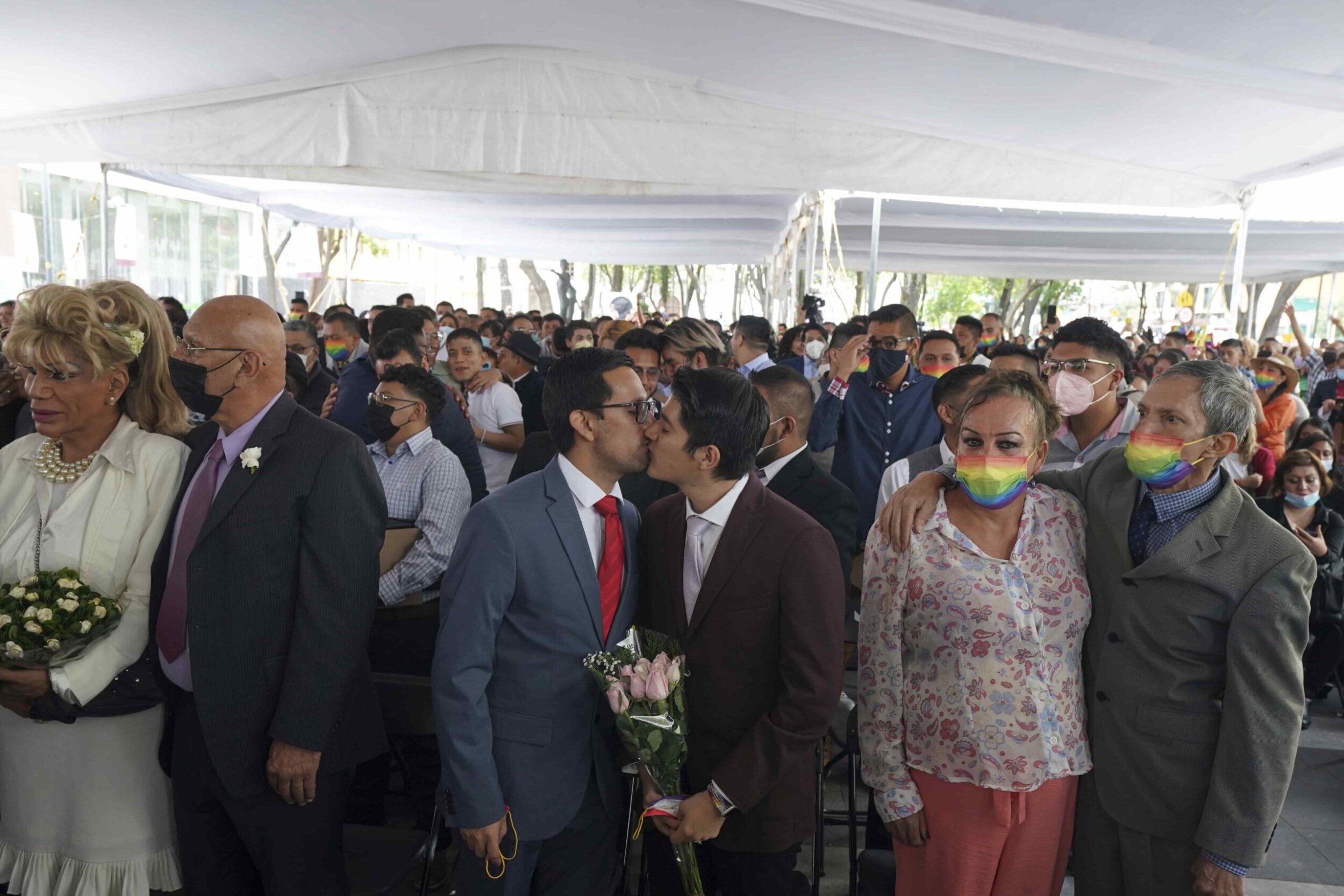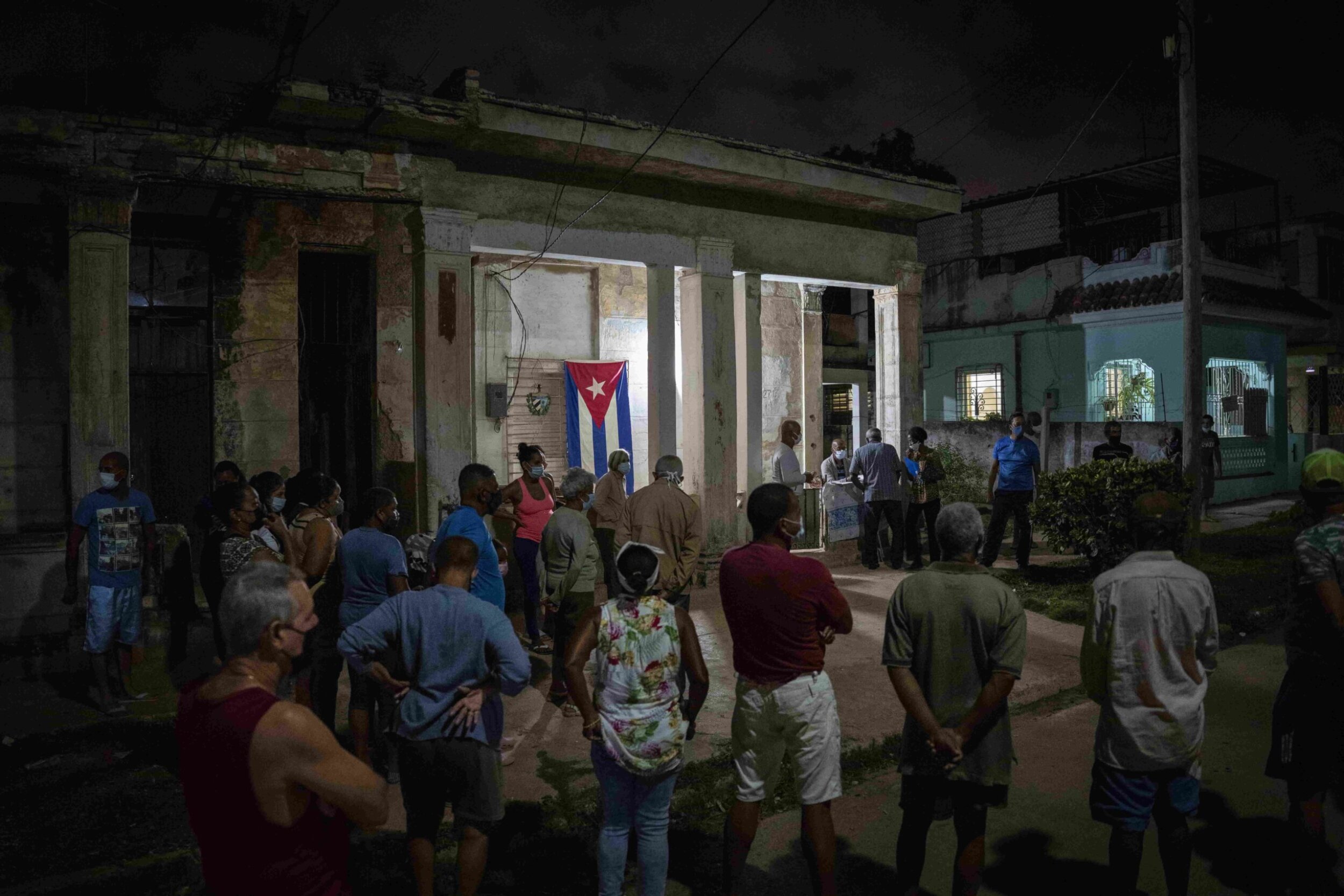With the U.S. Supreme Court’s conservative majority gleefully undermining the foundations of LGBTQ2S+ rights—and one justice openly suggesting the court ought to revisit its decisions legalizing sodomy and same-sex marriage—it’s tempting to fret about the future of the fight for equal marriage, especially in the U.S.
Around the globe, however, the fight for queer and trans rights has never been more vibrant and relevant. Slovenia became the latest country to legalize same-sex marriage on July 8, when its Constitutional Court ruled that banning it violated the constitution’s requirement for equal treatment. Same-sex marriage is now legal in 32 countries across the world, only 20 years after the Netherlands became the first country to legalize it in 2001. In several other countries, LGBTQ+ activists are successfully advocating for their rights.
In fact, the United States was relatively late to the same-sex marriage party, only legalizing it nationwide after the Supreme Court’s 2015 ruling in Obergefell v. Hodges. Seventeen other countries had beaten the U.S. to that mark by then, including Canada, New Zealand, Argentina, Brazil, South Africa and Portugal.
By 2022, nearly every country in Western Europe has legalized same-sex marriage, and more than 80 percent of the people living in the Americas live in a country with equal marriage rights. South Africa and Taiwan have become important beachheads for LGBTQ+ activists seeking to build support for equal marriage in sub-Saharan Africa and East Asia.
Here’s a look at 10 key battleground countries where the fight for same-sex marriage appears to be reaching a turning point.
Andorra
A decade of activism pays off in a big way
The tiny nation in the Pyrenees Mountains between France and Spain is the last country west of the Alps without legal same-sex marriage, but that appears poised to change soon. While the Social Democrats, the country’s opposition party, have been calling for same-sex marriage since 2009, it wasn’t until 2020 when the governing coalition relented and introduced a sweeping family law reform bill that would include a right to same-sex marriage and parenting. Sort of.
The bill maintains a separate word for same-sex civil marriages, casamentes in the native Catalan language, while matrimoni is reserved for religious marriages of opposite-sex couples. Confusingly, both words translate to “marriage” in English, and the legislation itself specifies that casamente is a form of matrimoni. Nevertheless, the distinction held up debate on the bill for more than two years, although legislators appear poised to give the bill final approval in the coming months.
The proposed legislation will also make it easier for trans people to update their identification documents to reflect their gender identity, ticking off several items on the local LGBTQ+ community’s wish list. A final vote on the bill has been scheduled for July 21.
Czechia
Bucking the regional reactionary trend

Credit: Lisa Leutner/AP Photo
For years, polls have consistently shown majority support for equal marriage in Czechia, but Czech politicians have been reluctant to push the issue forward. That may finally be changing, as a multiparty coalition of legislators has introduced a bill to legalize same-sex marriage. The main obstacle at this point appears to be government apathy, with little urgency to push the bill forward.
At least part of that stems from the fact that the current governing coalition includes a Christian-Democratic party so vehemently opposed to same-sex marriage that it has introduced a competing bill to ban it in the constitution. That bill doesn’t appear to have anywhere near enough support to pass, however.
As well, the Czech president has threatened to veto any same-sex marriage bill that comes to him, but under Czechia’s system, a veto can be overcome by holding a second vote.
If Czechia were to bring a same-sex marriage law into force, it would be the second Slavic and post-Communist country to do so, after Slovenia. A growing trend would set an important example in a region of Europe where reactionary forces have come to power.
But while the threat to LGBTQ+ people from the governments of Hungary and Poland shouldn’t be overlooked, neither should the effective advocacy of queer and trans groups in both countries. Support for LGBTQ+ rights and equal marriage is a thoroughly mainstream opinion in both countries now, having been taken up as a cause by both countries’ leading opposition figures.
And in the Baltic countries, Latvia and Lithuania are each poised to pass same-sex civil union laws later this year. While not full equality, it would be a big step for the post-Soviet countries.
Liechtenstein
When overwhelming public support meets institutional opposition
Tiny Liechtenstein appears poised to follow its larger neighbours Austria and Switzerland in legalizing same-sex marriage, with legislators vowing to hold consultations on the issue later this year. But although the idea enjoys wide support both in the public and in the national legislature, a potential same-sex marriage bill faces one major obstacle—the country’s head of state, Prince Hans-Adam II.
Unlike most other European monarchies, Liechtenstein’s prince maintains wide authority to veto laws, and he’s let it be known in the past that he opposes allowing same-sex couples to adopt. That objection may be moot, since the country’s Constitutional Court ruled last year that same-sex couples have the right to adopt. The prince hasn’t made any public statements about same-sex marriage since.
Mexico
Building connections with other social movements

Credit: Fernando Llano; AP Photo
Same-sex marriage is already legal across most of Mexico, but five of its 32 states still have not fully legalized it. However, 2022 could be the year that marriage equality sweeps the rest of the country.
Let’s back up a little bit. Mexico City was the first state to pass marriage equality back in 2009. By 2015, the Mexican Supreme Court ruled that same-sex marriage is a constitutional right, but under the Mexican legal system, the court typically couldn’t just strike down laws banning it. Since then, Mexicans living in states where same-sex marriages were banned would have to go to court to get an injunction allowing them to be married—a costly and time-consuming process.
Mexican activists have been using a multi-pronged strategy to change this. They’ve lobbied state congresses to change laws to allow same-sex marriage and gotten governors to issue directives that state-level bans are of no effect. They’ve also won at courts by seeking “actions of unconstitutionality”—a limited window when a court may strike down a new law if it is found unconstitutional—when a state passes a new law that includes a heterosexual definition of marriage.
Of the five remaining states, four have bills before their congresses seeking to legalize same-sex marriage. The fifth, Tamaulipas, is subject to an action of unconstitutionality before the courts now.
One of the striking aspects of the Mexican equal marriage movement is how it has attached itself in solidarity with other rights-seeking movements across the country. Marriage equality activists are also involved with the fight for abortion rights, same-sex couple adoption rights and trans rights—all of which have been guaranteed by the Mexican Supreme Court, but must continue to be fought state by state. Mexico’s LGBTQ+ activists have also been working hard to get laws banning hate crimes and conversion therapy passed at the state level. Incorporating these other aspects of human rights into the struggle seems to have helped build a lasting coalition while ensuring that activists remain vigilant even after initial victories.
Cuba
Extensive public engagement… of a sort

Credit: Ramon Espinosa/AP Photo
The Cuban government has been working on an overhaul of its family law, which is proposed to include same-sex marriage, for the past two years, with plans to bring the law to a final vote in Parliament in July and a referendum in September.
With the obvious caveat that Cuban democracy is not the most representative form of government in the world, it appears the government’s strategy of lengthy community consultations—it says 79,000 public meetings were held nationwide between February and April this year—has helped build support for it.
It also helps that Cuba’s LGBTQ+ community has high-profile support from Mariela Castro, daughter of former president Raúl Castro. She’s been leading the call for greater LGBTQ+ rights on the island for years.
Thailand
Refusing to settle for less than equal
Speaking of countries with a veneer of democracy … Thailand has long been a beacon of relative tolerance for LGBTQ+ people in Southeast Asia, even as reactionary attitudes have prevailed in its conservative, military-dominated government.
A proposal to legalize same-sex civil partnerships has been in government discussions for years, but when it finally arrived in Parliament this year, queer activists weren’t having it. Opposition parties introduced a competing bill that would guarantee full marriage equality for same-sex couples. What seemed like a long shot became a real possibility when the increasingly independent Parliament advanced both options for further debate. Although the government has expressed clear opposition to same-sex marriage, Parliament may yet stand its ground as it has with other recent rights legislation. The big question mark is whether either bill can be passed before next year’s general elections.
If Thailand passes marriage equality, it will be the first country in Southeast Asia to do so and could be influential upon neighbouring Vietnam and Cambodia, where growing rights movements are advocating for equal marriage.
Japan
Pursuing diverse strategies
Japan’s equal marriage advocates have seen some stunning victories and setbacks in the last couple of years, but they’re buoyed by a clear trend of growing support and acceptance from the public.
With the national political class dominated by older, conservative men, advocates have had little success getting the National Diet to pass any kind of recognition of same-sex couples. But activists have found success lobbying local governments to issue “partnership certificates” that offer certain limited rights to same-sex couples. Eleven of Japan’s 47 prefectures, and more than 200 municipalities—home to more than half of Japan’s population—now issue the certificates.
In parallel, activists have pursued marriage equality through the courts, with mixed results. Two local courts have issued contradictory rulings as to whether the current ban on same-sex marriage is constitutional, although both said the issue was for the legislature to resolve. A third court is due to rule later this year.
India
Building upon legal victories

Credit: Mahesh Kumar A./AP Photo
Finding India on this list may be surprising, given that the country only legalized gay sex four years ago. But the same legal strategy that decriminalized sodomy in the world’s largest democracy may also bring about equal marriage.
Queer activists in India are already testing this by petitioning for a right to same-sex marriage under the various laws that govern religious and secular marriages in India. While the government is fighting the case, it seems that the courts have already tipped their hand in previous rulings establishing that LGBTQ+ people have a right to equality, sexual intimacy, privacy and family life. Still, the court could decide that full equal marriage is a bridge too far.
In addition, an opposition MP has introduced a bill to legalize same-sex marriage, but it’s unlikely to advance in the current Parliament.
Namibia
Making an emotional case to the public
A long, slow, legal strategy to attain marriage equality is coming to a head in Namibia, the sparsely populated country northwest of South Africa.
Several same-sex couples who married overseas are suing the government for recognition of their marriages and of their children. Lack of recognition has left children without citizenship, spouses without residency rights and basically threatened to force queer families into exile.
In January, the High Court of Namibia issued a ruling that sympathized with plaintiffs seeking equal marriage but found that it couldn’t overrule a 2001 Supreme Court decision against same-sex marriage. The ruling openly encouraged an appeal to the Supreme Court, which is still pending.
The legal battle has attracted favourable media attention and has helped galvanize support for queer rights more generally. One lower court has even found that anti-LGBTQ+ discrimination is unlawful under the constitution. While the government has not announced plans to legislate for same-sex couples, it recently announced its intention to repeal the unenforced colonial-era law banning sodomy, although no bill has yet been tabled to do so.
Greece
Drawing influence from regional leaders
According to reports from Greek media, the government has been considering introducing a same-sex marriage bill since May and has been working in concert with other European governments to ensure that it encompasses all legally necessary amendments. The government had previously set up a committee on improving the rights of LGBTQ+ people shortly after the European Union called on its member states to improve legal protections for queer people.
Not content to wait, the opposition SYRIZA party led by former prime minister Alexis Tsipras introduced a same-sex marriage and adoption bill in Parliament in June. Sustained public pressure will likely be needed to get same-sex marriage past the finish line, but Greece is closer than it’s ever been to achieving marriage equality.
If it passes, expect the debate to be picked up in neighbouring Cyprus, which passed a civil union law around the same time Greece did in 2015. Its Parliament is currently considering a conversion therapy ban, months after the Greek Parliament passed one.
Other places to watch out for
Many countries in Latin America and the Caribbean are bound by a ruling of the Inter-American Court of Human Rights (IACHR) to provide for same-sex marriage, but are still holding out.
A same-sex marriage bill has been introduced by a minor party in the Peruvian Congress, but it is unlikely to advance in the overwhelmingly right-wing and socially conservative chamber. The country’s Constitutional Court also recently dismissed an equal marriage case in a ruling that experts denounced as legal nonsense.
Activists have also been waiting more than six years for the Supreme Court of Panama to rule on a series of same-sex marriage cases. Although Panama is bound by the IACHR ruling, some activists fear the court is planning to ignore it, as the court did in Peru.
Barbadian prime minister Mia Mottley pledged to introduce same-sex civil unions and hold a referendum on marriage way back in 2020, but hasn’t taken any steps to advance it since.
Finally, we’d be remiss if we didn’t return to the United States here. With the threat to same-sex marriage looming, activists have already begun gearing up for a long fight to reinforce queer rights across the country. In most cases, that means codifying equal marriage into state law, repealing sodomy statutes that persist in 14 states and repealing state constitutional bans on same-sex marriage. In order for that to happen, Democrats need to gain or expand power in the November midterm elections, and eventually submit constitutional amendments to votes in the coming years. It just goes to show that the advances we make as a community cannot be taken for granted. Our legal and political victories are never the whole story, and the only way we can secure our human rights is through continued vigilance and activism.


 Why you can trust Xtra
Why you can trust Xtra


